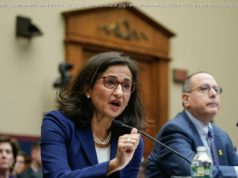Rachel Brand’s resignation — and who fills that role — has implications for the Mueller investigation.
Associate Attorney General Rachel Brand, the No. 3 official in charge at the Justice Department, is reportedly leaving the administration.
Brand’s departure is making ripples because, as third in command at DOJ, she was next in line to oversee special counsel Robert Mueller’s Russia investigation should the embattled Deputy Attorney General Rod Rosenstein lose his job, or be forced to recuse himself from the investigation entirely.
So the question now is who will take over the critical job.
The associate attorney general is appointed by the president, and confirmed by the Senate. But until President Donald Trump names someone to fill that slot, an acting associate attorney general will temporarily fill that role.
According to the Justice Department, the solicitor general is next in line to be the acting associate attorney general. But the president could also choose another Senate-confirmed official to fill that role.
But a lot can happen in 210 days — the standard time period an “acting” can serve under the Federal Vacancies Act of 1998, which governs who can serve in temporary positions, how long he or she can serve, and how an agency’s work gets (or doesn’t get) done after that period of service expires.
Anne Joseph O’Connell, a law professor at Berkeley and an expert on the Vacancies Act, dissected the law for Vox, explaining why and when it applies and its complications and gray areas.
O’Connell told Vox the law isn’t just relevant to Trump’s administration. “But just given the delays both in nomination and confirmation of agency officials in recent administrations the Vacancies Act — although it hasn’t kind of the same media attention — comes into play.”
This interview has been edited and condensed.
What, exactly, is the Federal Vacancies Act? What does it accomplish?
We’ve had statutes since basically the founding of the country to help fill in positions that haven’t been filled through the constitutional mechanism — you get appointed by the president and confirmed by the Senate — if you’re a really high-level officer, or what we call “principal officers.”
The Constitution says if you’re still an important person, but not quite as important as principal officers, we call you an “inferior officer.” The Constitution says the default is that those “inferior officers” are also appointed by the president and confirmed by the Senate.
But if Congress chooses otherwise, they can be appointed by the president alone, by the head of the department, or by a court of law.
There can be, both for principal and inferior officers who go through the Senate confirmation process, vacancies. These statutes help to fill those holes temporarily.
What is the difference between “principal officer” and “inferior officer”?
This is actually still a somewhat contested area of law. The idea is that if you exercise significant authority, you’re an officer as opposed to an employee. The difference between principal and inferior officer is also fuzzy, and comes down to whether you’re directed and supervised by someone other than the president.
So it’s not a bright line. But a Cabinet secretary like the attorney general is directed and supervised by no one else but the president, so Cabinet secretaries are definitely principal officers. I think assistant secretaries — so in the Department of Justice, the equivalent would be assistant attorneys general — those positions are inferior officer positions.
But note that AAG positions in the Department of Justice are appointed by the president, confirmed by the Senate, even though they’re inferior officers.
Congress, by legislation, can change that. Normally it doesn’t like to, because why would you go from a Senate-confirmed position to just allowing the president by himself to appoint?
Congress is giving up power. It happens — there are obviously positions that Congress chooses to just have the president appoint. In 2012, there was the Presidential Appointment Streamlining Act, which, because of all these confirmation delays, stripped Senate confirmation from about 160 positions.
So why are we talking about the Federal Vacancies Act now?
The Vacancies Act basically does three things. The first thing is identify a set of positions that can be filled temporarily. Basically all positions in Cabinet departments and executive agencies that are normally presidentially appointed and Senate-confirmed can be filled under the Vacancies Act.
This excludes most independent regulatory commissions, such as the National Labor Relations Board members, the commissioners of the Federal Communications Commission, the Federal Trade Commission, and the Securities and Exchange Commission.
All of those commissioners — or board members in the case of the NLRB — are appointed by the president and confirmed by the Senate, but they are not covered by the Vacancies Act. So when there are vacancies in the NLRB with regard to its five members, you cannot have acting NLRB members. There are a few exceptions. But generally, independent regulatory commissions are not covered.
So that’s the first point of the Vacancies Act: It defines a set of positions that can be filled temporarily.
The second?
The second thing the Vacancies Act does is say who can fill those positions. There are basically three categories of people who can fill in an “acting capacity.” So who are those people?
The first category, which is the default category, are called “first assistants” to the particular office. So, for example, if the attorney general position is vacant, the first assistant to the attorney general is the deputy attorney general. That’s the default of who serves — but there are other categories the president can choose [from] if he doesn’t want to go with the default of the first assistant.
The second category the president could choose is someone who’s been confirmed to a different position, even if it’s in a different agency. So for example, with the Consumer Financial Protection Bureau (CFPB) — let’s put aside the question about whether the Vacancies Act applies — but if the Vacancies Act applies, who did the president choose? Mick Mulvaney, who was Senate-confirmed to be director of Office of Management and Budget (OMB).
Another an example would be Sally Yates. At the change of the White House, Sally Yates was the deputy attorney general, so she was the first assistant — that would be the default of who served as acting attorney general. But when she was fired, the person chosen was the US attorney for the Eastern District of Virginia [Dana Boente], who’s someone else appointed by the president and confirmed by the Senate.
But when it comes to Senate-confirmed, does it matter the administration? Wasn’t Dana Boente confirmed as US attorney under Obama?
It doesn’t matter. They don’t have to get reconfirmed by a new president. Maybe the best example is Secretary [Robert] Gates as Defense Secretary. He was secretary of defense at the end of George W. Bush’s administration, and President Obama kept him on, and he didn’t have to get confirmed again by the Senate.
Gotcha. There’s still one more category to go, correct?
Now the third category of potential people who can serve in an acting role is someone who is at least paid at the level of GS-15 on the federal pay scale or higher. You could call that third category a “senior careerist.”
For example, at the start of President Trump’s administration, in the Department of Treasury, he needed his secretary of the Treasury, and it was clear that Mnuchin was not going to be confirmed right away.
So the acting Treasury secretary was Adam Szubin. Adam was not the first assistant; he wasn’t presidentially appointed, confirmed by the Senate. He was the third category — he was a senior-enough careerist. He was someone acceptable to the Trump White House to serve in this acting capacity until Mnuchin was confirmed.
So if you think about it, basically, who can serve under the Vacancies Act? The first assistant is the default, or the president can choose another Senate-confirmed person. You could think of that person as more politically accountable, because they were chosen by the president and confirmed by the Senate for some other job.
Or the president could choose someone who you might call as more expert — someone in the bureaucracy who’s gotten to a high-enough-level position. And you might think differently about “actings” depending on which group the person is being pulled from.
Okay, so the Federal Vacancies Act determines which positions can be temporarily filled, and who can fill them. What’s the third thing it achieves?
The last category of the Vacancies Act is how long these acting officers can serve. So the first category is what positions are covered by the Vacancies Act; the second thing is who can staff them as an acting official; and the third is how long can someone serve as an acting officials.
Normally, it’s 210 days. But there’s so many complexities: Is someone nominated for the job? Has Congress gone into the recess? If the nomination is returned, the clock can restart.
The first thing to know is that generally, it’s limited to how long someone can serve.
No. 2, in the first year of the administration, it’s longer because there’s many more positions to fill because most people do resign at the end of the previous administration. Nomination and confirmation takes time, and so the 1998 Vacancies Act gives 300 days for vacant positions at the start of the administration.
So it sounds like the Vacancies Act kind of defers to the executive branch, so it has time and flexibility to fill spots. Is that a fair characterization?
I think it’s a compromise. Before the 1998 Act, President Clinton was criticized for having acting officials under an earlier Vacancies Act that served past the statutory deadlines — but the earlier statute did not have considerable consequences for that. I mean, Congress could hold hearings and be upset.
It was Bill Lann Lee, who was the acting assistant attorney general for civil rights in the Department of Justice and served past the statutory deadline. But his actions were not considered to be illegal; there was nothing that voided his action.
And so what the 1998 Vacancies Act did was try to broker a compromise to allow the executive branch to staff these important jobs, but put a limit on it to protect the Senate’s prerogative of confirmation in these positions.
So the most important thing the Vacancies Act in 1998 did — in addition to identifying the [eligible] positions, saying who could fill them and for how long — was specify consequences. So if there’s someone serving as an acting officer who does not meet those three categories I described, or if there’s someone who’s serving past the time limits in the act, generally, anything that person does is legally void.
So it sounds like, contrary to my first assumption, this 1998 Federal Vacancies Act intended to give a little more power back to Congress.
Now, I should say there is a big loophole — I call it a loophole; the Vacancies Act does not call it a loophole. All these positions covered by the Vacancies Act that were vacant at the start of President Trump’s administration, those got to be filled for 300 days by someone in one of those three categories. Well, the 300-day mark has passed. Now that job is vacant. Trump doesn’t get to choose a second acting. You might think, if you haven’t actually nominated and gotten someone confirmed, what do you do?
What do you do?
Basically, the Vacancies Act allows agencies to delegate certain tasks of that vacant position to other people in the agency.
The formal word would be “subdelegation” — you delegate duties to other positions. Now, the Vacancies Act says there are certain functions and duties of a vacant office that can’t be delegated to someone else — but those functions and duties have to be specified by statute or by agency regulation.
Home
United States
USA — Political The top official at the Justice Department has resigned. The Federal Vacancies...






